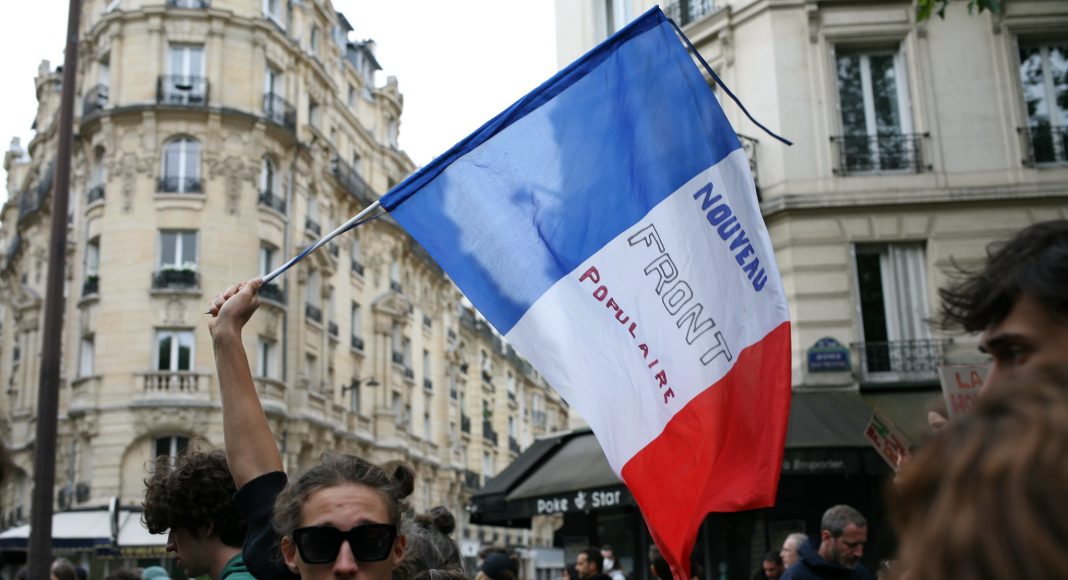The two rounds of the French legislative elections took place on 30 June and 7 July. The far-right Rassemblement National (RN), or National Rally, came in third place, with 142 parliamentary seats, behind the centrist Ensemble coalition (including the Renaissance party of President Emmanuel Macron) and the left-leaning Nouveau Front Populaire (NFP), or New Popular Front (NFP). Nonetheless, RN is now the single largest party in the French parliament, beaten in the final round of voting only by a last-minute electoral pact between the centrist and left-wing alliances.
These snap elections were called by Macron after RN won a sweeping victory in June’s European elections, coming first in 93% of French towns and cities. While it is clear that on 7 July many voters coalesced around a real fear of a party with its roots in fascism coming to power in France, the rise of the far-right reflects the deepening anger of the most reactionary sections of the working class against its abandonment by the mainstream parties, alongside the abject failure of the left to adequately challenge the state’s racist narrative and practice, particularly on migration.
The rise of the far-right
Created in 1972 as the National Front, RN counts among its founding members Jean-Marie Le Pen (the father of current leader Marine Le Pen), former members of the Waffen SS Pierre Bousquet and Leon Gaultier, as well as neo-Nazi sympathisers and politicians nostalgic for French colonialism in Algeria. In 2002, 2017 and 2022, the far-right made it to the second round of the presidential elections, playing on fears of illegal immigration and terrorism, but also promising to give French people back their purchasing power; in 2022, RN won 41.45% of votes in the second round. The party traditionally attracts rural populations, which are generally older and less diverse, but has systematically worked to widen its appeal amongst the urban working class and young voters, particularly in areas which have experienced sharp industrial decline over the past decades. Nearly half of the French electorate has voted RN at some point.
The party has made major efforts to overhaul its image in recent years in a bid for respectability, including changing its name and rejecting the ‘far-right’ label. French media has played a key role in normalising the far-right, while demonising the left as ‘extremist’ – especially the reformist La France Insoumise (LFI) or France Unbowed of Jean-Luc Melenchon. This has been ramped up during France’s unstinting support for Zionism during the war in Gaza, with the LFI constantly categorised by politicians across the spectrum as ‘anti-semitic ’. Macron is among those who have been central to deliberately equating LFI with RN, as representing two sides of ‘extremism’.
Who will fight for the working class?
Macron’s Renaissance, a party formed in 2022 to supposedly ‘transcend left-right divisions’, has created the conditions in which the far-right has flourished. Despite promises of economic prosperity, Macron’s presidency has been characterised by constant attacks on, and open disdain for, the working class. In its response to mass protests – whether those against the rising cost of living by the Gilets Jaunes in 2018 or those that broke out last year over both police violence and racism and pension reforms, the ‘centrist’ Renaissance has consistently shifted to the right. In December, Macron’s government passed vicious new measures to reduce immigration, describing it as ‘the shield’ France needed to protect itself against an influx of foreigners. It has clamped down savagely on pro-Palestine protests, raising the spectre of ‘Islamism’. Tens of billions of euros have been slashed from public sector budgets, benefits are under attack and infrastructure is crumbling, particularly in rural areas. With sluggish growth (0.7% forecast for 2024) and a debt to GDP ratio over 112%, working people continue to face the brunt of capitalist crisis, while inflation eats into the already low purchasing power of workers .
In the absence of any progressive opposition, RN has capitalised on growing working class disaffection through its nationalist and racist appeal. It has promised to address the cost of living crisis, clamp down on immigration and abolish the automatic right to French nationality of those who have lived in France for more than five years. Left parties, meanwhile, speak to themselves, putting all their efforts into building electoral alliances, rather than attempting to build any consistent base within the working class. The huge anti-government protests of recent years have simply petered out, leaving no lasting grassroots organisation.
The newest ‘left’ coalition, the NFP, is an uneasy alliance between the LFI, the Socialist Party, Greens and the reformist Communist Party. Some of its key policies, including measures to combat police violence, some nationalisations and the repeal of the El-Khomri law passed under Socialist President Francois Hollande that severely curtailed workers’ rights, have all been scrapped following objections from the Greens and Socialist Party. The NFP programme takes a neo-colonial position on New Caledonia, using the term ‘common destiny’ to describe the relationship between imperialist France and the islands. On Palestine, the NFP programme calls for sanctions on Netanyahu’s far-right Israeli government only so long as it ‘does not respect international law’, and makes repeated concessions to Zionism.
No challenge to the far-right will come from bourgeois politicians working to shore up a crisis-ridden French capitalism. It can only come from a movement that builds among and stands with the most oppressed sections of the working class. It is not in the national assembly but in the streets that working people will defend themselves not only against attacks on jobs and benefits but also against racism, police violence, and fascism – not just against the far-right, but against the brutal French state itself.
Sarah Guebre-Egziabher




